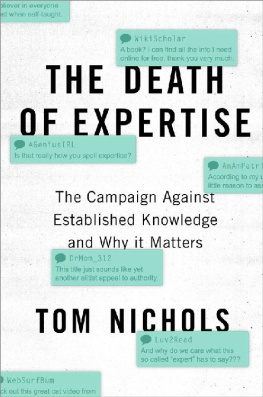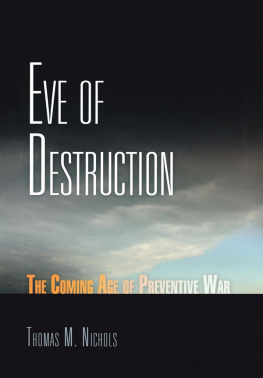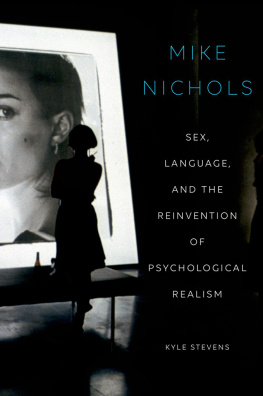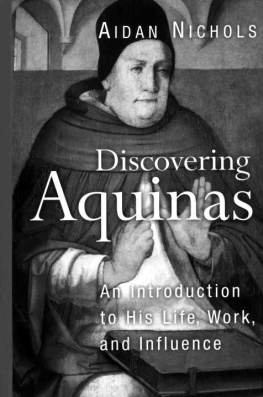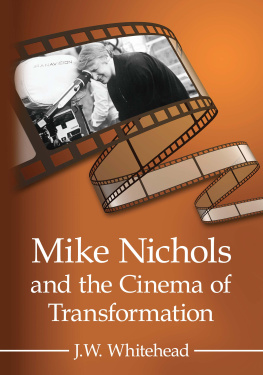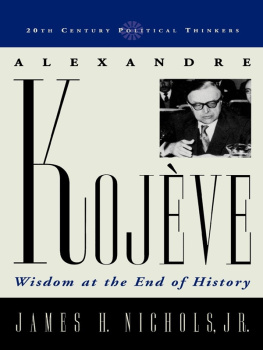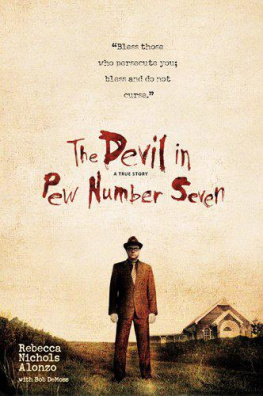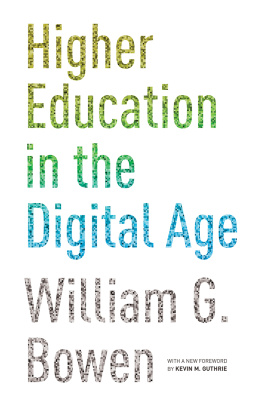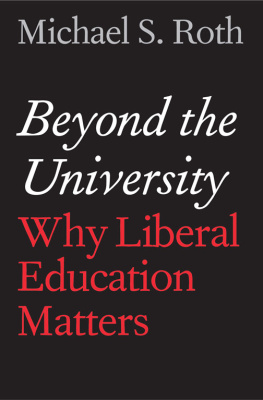THE DEATH OF EXPERTISE
THE DEATH OF EXPERTISE
The Campaign against Established Knowledge and Why It Matters
Tom Nichols


Oxford University Press is a department of the University of Oxford. It furthers the Universitys objective of excellence in research, scholarship, and education by publishing worldwide. Oxford is a registered trade mark of Oxford University Press in the UK and certain other countries.
Published in the United States of America by Oxford University Press
198 Madison Avenue, New York, NY 10016, United States of America.
Oxford University Press 2017
All rights reserved. No part of this publication may be reproduced, stored in a retrieval system, or transmitted, in any form or by any means, without the prior permission in writing of Oxford University Press, or as expressly permitted by law, by license, or under terms agreed with the appropriate reproduction rights organization. Inquiries concerning reproduction outside the scope of the above should be sent to the Rights Department, Oxford University Press, at the address above.
You must not circulate this work in any other form and you must impose this same condition on any acquirer.
Library of Congress Cataloging-in-Publication Data
Names: Nichols, Tom, 1960- author.
Title: The death of expertise : the campaign against established knowledge and why it matters / Tom Nichols.
Description: New York, NY : Oxford University Press, [2017] |
Includes bibliographical references.
Identifiers: LCCN 2016037219 | ISBN 9780190469412 | eISBN 9780190469436
Subjects: LCSH: Information societyPolitical aspects. | Knowledge, Theory ofPolitical aspects. | Knowledge, Sociology of. | ExpertisePolitical aspects. | Education, HigherPolitical aspects. | InternetPolitical aspects.
Classification: LCC HM851 .N54 2017 | DDC 303.48/33dc23
LC record available at https://lccn.loc.gov/2016037219
For
Lynn Marie Nichols
and
Hope Virginia Nichols
Expert wife and peerless daughter
CONTENTS
The death of expertise is one of those phrases that grandly announces its own self-importance. Its a title that risks alienating a lot of people before they even open the book, almost daring the reader to find a mistake in it somewhere just to take the author down a peg. I understand that reaction, because I feel much the same way about such sweeping pronouncements. Our cultural and literary life is full of premature burials of everything: shame, common sense, manliness, femininity, childhood, good taste, literacy, the Oxford comma, and so on. The last thing we all need is one more encomium for something we know isnt quite dead.
While expertise isnt dead, however, its in trouble. Something is going terribly wrong. The United States is now a country obsessed with the worship of its own ignorance. Its not just that people dont know a lot about science or politics or geography; they dont, but thats an old problem. And really, its not even a problem, insofar as we live in a society that works because of a division of labor, a system designed to relieve each of us of having to know about everything. Pilots fly airplanes, lawyers file lawsuits, doctors prescribe medication. None of us is a Da Vinci, painting the Mona Lisa in the morning and designing helicopters at night. Thats as it should be.
No, the bigger problem is that were proud of not knowing things. Americans have reached a point where ignorance, especially of anything related to public policy, is an actual virtue. To reject the advice of experts is to assert autonomy, a way for Americans to insulate their increasingly fragile egos from ever being told theyre wrong about anything. It is a new Declaration of Independence: no longer do we hold these truths to be self-evident, we hold all truths to be self-evident, even the ones that arent true. All things are knowable and every opinion on any subject is as good as any other.
This isnt the same thing as the traditional American distaste for intellectuals and know-it-alls. Im a professor, and I get it: most people dont like professors. When I began my teaching career nearly three decades ago, it was at a college not far from my hometown, and so I would drop in now and then to say hello and visit a small tavern owned by my brother. One evening, after I left, a patron turned to my brother and said, Hes a professor, huh? Well, he seems like a good guy anyway. If youre in my profession, you get used to that.
But thats not why I wrote this book. Intellectuals who get outraged over zingers about the uselessness of intellectuals should find a different line of work. Ive been a teacher, a political adviser, a subject-matter expert for both government and private industry, and a commenter on various media. Im used to people disagreeing with me; in fact, I encourage it. Principled, informed arguments are a sign of intellectual health and vitality in a democracy.
Rather, I wrote this because Im worried. We no longer have those principled and informed arguments. The foundational knowledge of the average American is now so low that it has crashed through the floor of uninformed, passed misinformed on the way down, and is now plummeting to aggressively wrong. People dont just believe dumb things; they actively resist further learning rather than let go of those beliefs. I was not alive in the Middle Ages, so I cannot say it is unprecedented, but within my living memory Ive never seen anything like it.
Thats not to say that this is the first time Ive ever thought about this subject. Back in the late 1980s, when I was working in Washington, DC, I learned how quickly people in even casual conversation would immediately instruct me in what needed to be done in any number of areas, especially in my own areas of arms control and foreign policy. (As usual, it was what they should do, as in they ought to .) I was young and not yet a seasoned expert, but I was astonished at the way people who did not have the first clue about those subjects would confidently direct me on how best to make peace between Moscow and Washington.
To some extent, this was understandable. Politics invites discussion. And especially during the Cold War, when the stakes were global annihilation, people wanted to be heard. I accepted that this was just part of the cost of doing business in the public policy world. Over time, I found that other specialists in various policy areas had the same experiences, with laypeople subjecting them to ill-informed disquisitions on taxes, budgets, immigration, the environment, and many other subjects. If youre a policy expert, it goes with the job.
In later years, however, I started hearing the same stories from doctors. And from lawyers. And from teachers. And, as it turns out, from many other professionals whose advice is usually not contradicted easily. These stories astonished me: they were not about patients or clients asking sensible questions, but about those same patients and clients actively telling professionals why their advice was wrong. In every case, the idea that the expert knew what he or she was doing was dismissed almost out of hand.
Worse, what I find so striking today is not that people dismiss expertise, but that they do so with such frequency, on so many issues, and with such anger. Again, it may be that attacks on expertise are more obvious due to the ubiquity of the Internet, the undisciplined nature of conversation on social media, or the demands of the twenty-four-hour news cycle. But there is a self-righteousness and fury to this new rejection of expertise that suggest, at least to me, that this isnt just mistrust or questioning or the pursuit of alternatives: it is narcissism, coupled to a disdain for expertise as some sort of exercise in self-actualization.

